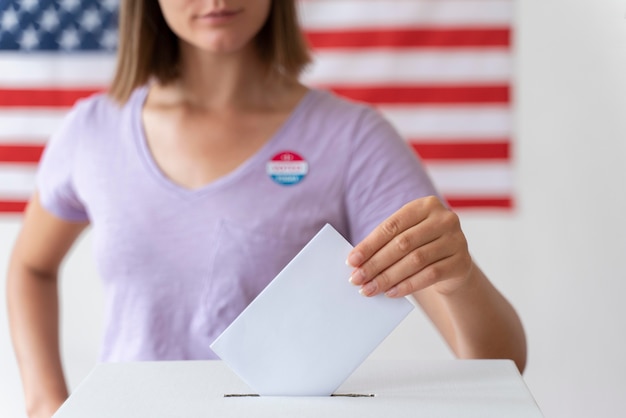2025 Election Calendar: Key Dates and Deadlines for US Voters

The 2025 Election Calendar is crucial for US voters, outlining key dates and deadlines for primary elections, voter registration, absentee voting, and the general election, ensuring informed participation in the democratic process.
Navigating the US election system requires awareness of critical dates. The 2025 Election Calendar: Key Dates and Deadlines You Need to Know provides a comprehensive overview to empower informed participation.
Understanding the Importance of the 2025 Election Calendar
The election calendar serves as a roadmap for voters, candidates, and election officials. It ensures timely and organized electoral processes. Becoming familiar with its contents can help you become better prepared for the upcoming elections.
Having a clear understanding of the election calendar enables voters to plan ahead, register on time, and participate in primary elections. It also helps in understanding deadlines for absentee ballots and early voting, making access to the ballot box more convenient and informed.
Why is the 2025 Election Calendar Important?
The 2025 election calendar is important for several reasons, some of which are.
- Informed Participation: Voters can stay informed about key dates and deadlines, enabling them to participate fully in the electoral process.
- Effective Planning: The election calendar allows for proper planning, ensuring you don’t miss important deadlines such as voter registration or absentee ballot requests.
- Reduced Errors: Clear timelines help prevent errors and confusion, contributing to smooth election administration.
Election stakeholders can minimize confusion and ensure informed participation by paying attention to the information on the election calendars. This is a major key to a free and fair election.
Key Dates for Voter Registration in 2025
Registering to vote is the first step toward participating in the democratic process. Each state has its own voter registration deadlines, making it essential to be aware of those in your specific location.
Understanding these deadlines ensures that eligible citizens do not miss the opportunity to cast their ballots. Late registration may result in ineligibility to vote in the upcoming election.

Online Voter Registration
Many states now offer online voter registration, making it more convenient for eligible citizens to register. Here are a few key points:
- Accessibility: Online registration is accessible 24/7, providing flexibility for individuals with busy schedules.
- Required Information: Generally, you’ll need your driver’s license or state ID and your Social Security number.
- Confirmation: After registering online, you may receive a confirmation email or a voter registration card in the mail.
It’s important to check your state’s specific requirements and guidelines to ensure your registration is processed successfully.
Primary Election Dates and Their Significance
Primary elections are held to select candidates from each political party who will run in the general election. These elections are crucial in shaping the final ballot.
Participating in primary elections enables voters to have a say in who represents their party in the general election.
Understanding Open and Closed Primaries
Primary elections can be either open or closed, depending on the state. Here’s what you need to know:
Open Primaries:
These enable voters from any political party to cast votes in a primary election.
Closed Primaries:
These are limited to voters who are registered with a specific political party.
- Impact on Voter Choice: Open primaries provide more flexibility, while closed primaries ensure that only party members influence the selection of candidates.
- Registration Requirements: In closed primary states, you may need to register with a specific party by a certain deadline to participate in the primary.
- Independent Voters: In some states, independent voters may be able to participate in either party’s primary, depending on local rules.
Be sure to check your state’s primary election rules to understand how you can participate.
Absentee Voting and Early Voting Options
Absentee voting and early voting provide flexible options for those unable to vote in person on Election Day. These methods can significantly enhance voter turnout.
Understanding absentee and early voting options ensures that everyone has the opportunity to exercise their right to vote, regardless of their circumstances.

Key Deadlines for Absentee Ballots
When voting by absentee ballot, it’s important to be mindful of the deadlines:
Request Deadline:
This is the date by which you must request an absentee ballot from your local election office.
Submission Deadline:
This is the date by which your absentee ballot must be received by the election office.
- Postal Delays: Allow plenty of time for your ballot to be mailed to avoid delays.
- Online Tracking: Some states offer online tracking services to monitor the status of your absentee ballot.
- Verification: If your absentee ballot is rejected due to a signature mismatch or other issue, you may have the opportunity to correct it.
Make sure to follow all instructions carefully to ensure your absentee ballot is counted.
Understanding the General Election Date
The general election is when voters choose the final candidates for various offices, including the President of the United States.
Participating in the general election is a fundamental aspect of civic duty, as it determines the leadership and direction of the country.
Presidential Election Year
In the U.S., the general election for president occurs every four years. The next one will occur in 2024, but it’s important to stay updated for 2025, as elections also occur during that year. Here are a few tips.
Stay Informed: Keep abreast of important events and developments leading up to the year of the presidential election.
Confirm Your Registration: Make sure that your registration is valid, accurate, and up to date.
- Election Day Details: Mark your calendar so that you remember to vote on election day. You do not want to miss the vote.
- Candidate Research: Familiarize yourself with the stance each candidate takes on important issues.
- Engage in Discussions: Talking to your community and engaging in discussions will help you to be informed about elections.
Ensure you have the right information so you can be prepared to participate in the upcoming presidential election.
Resources for Staying Informed About Election Dates
Many resources are available to help voters stay informed about election dates and deadlines. These resources include official election websites, non-partisan organizations, and media outlets.
Utilizing these resources can enhance voter awareness and participation, ensuring that more people are engaged in the democratic process.
Official Election Websites
State and local election websites provide valuable information, including:
- Voter Registration Status: Check your registration status and update your information if necessary.
- Polling Place Locator: Find your assigned polling place for Election Day.
- Sample Ballots: View sample ballots to familiarize yourself with the candidates and issues on the ballot.
These websites also provide information on upcoming elections, voter ID requirements, and contact information for local election officials.
Planning ahead and understanding the election calendar is key to voting. Election officials can ensure a smooth election when voters are well-prepared.
| Key Aspect | Brief Description |
|---|---|
| 🗳️ Voter Registration | Ensure you’re registered by your state’s deadline to vote. |
| 🗓️ Primary Elections | Select candidates from each party to run in the general election. |
| ✉️ Absentee Voting | Request and submit your ballot by the deadlines if you can’t vote in person. |
| 🗓️ General Election | Choose the final candidates for various offices, including the President. |
Frequently Asked Questions (FAQs)
▼
The general election is held every four years on the Tuesday after the first Monday in November. Mark the date to ensure you participate in selecting the next leaders.
▼
You can register online, by mail, or in person at your local election office. Each state has specific requirements, so check your state’s election website. Be sure to register by the deadline!
▼
Absentee voting allows you to vote by mail instead of going to a polling place on Election Day. Request an absentee ballot by the deadline, fill it out, and return it promptly.
▼
Primary elections narrow down the field of candidates from each political party before the general election. The specific rules of this election depend on the state in which its happening.
▼
Refer to official election websites or contact your local election officials for accurate and up-to-date details. Also, verify from nonpartisan groups to get the most unbiased and useful information.
Conclusion
Staying informed about election dates and deadlines is crucial for all US voters. By understanding the key aspects of the election calendar and utilizing available resources, you can actively participate in the democratic process. Remember to register, plan ahead, and make your voice heard!
